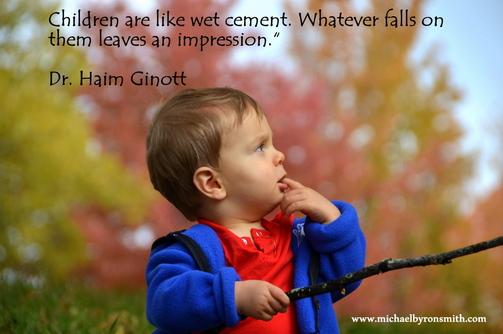 Photo: M Smith
Photo: M Smith Bill Gates
Have you ever had so much information thrown at you that it felt like you were drinking from a fire hose? This happens to me more often than I would like to admit, especially now that I’m older. Believe it or not, very young children can handle an explosion of new information much better than most adults. This is a time when we should be stimulating all their senses with gusto. If we don’t take advantage of this ability, we’ve done them a major disservice.
Similar to a skyscraper, a child’s foundation is the most important characteristic allowing further growth. I’ve written in the past about preschool kids (usually 3-5 years old) and what you can do to help them ‘learn to love’ learning. Let me take you back before they are considered preschool, back to their birth and days as an infant/toddler.
Here are two excerpts from my book, “The Power of Dadhood” which discuss early learning.
“…there is a fertile “window of opportunity” during the early years of life when a child is most receptive to emotional, social, and intellectual stimulation (Maeroff). Without this stimulation, a child’s development will suffer.”
And further,
“Most people don’t realize the impact fathers have on their infant children. Many men think young children don’t really understand anything until they are older; then it’s time for fathers to get more involved. But infants are actively engaged in unconscious learning long before understanding comes. They absorb things like a sponge. An infant’s brain and nervous system without stimulation is like a sponge lying in the desert. In the wrong environment, the sponge is useless. There is nothing to soak up. The richness of the infant’s mind needs nourishment, and the father is a source unique from the mother to provide this nourishment.”
Wasting the potential of a young mind is as destructive as forgetting to pull the ripcord on a parachute. That is why you must engage them as soon and as much as possible with conversation, reading, imaginative play, artwork, etc. Doing so will exercise all those synapses in their brains, making new connections and paving the way for more and faster traffic.
In an article I wrote for the National Fatherhood Initiative, entitled The Magic of Learning to Your Preschool Children, I mentioned that a child from a high income family will hear many millions of more words than a child from a low income family and those words will be encouraging whereas the words of the low income family will be largely discouraging. School teacher, child psychologist and psychotherapist, Haim G. Ginott, PhD. was quoted as saying, “Children are like wet cement. Whatever falls on them makes an impression. If nothing falls on a child, there no impressions. If the wrong words, examples, or treatment fall on a child in his early years, those impressions hardens and it is difficult to shake.
Dr. Ginott’s quote is backed up by Melinda Wenner Moyer, a parenting advice columnist who said, “Children who don’t go to preschool are usually from more disadvantaged families, which means they watch lots of TV and are yelled at more than they are praised, which some researchers believe can stunt cognitive development.”
Early childhood experiences are vitally important factors in determining future success or failure. A child’s early environment has a direct and lasting impact on the architecture of their brain. You want to build the best brain possible for them! So dads, get in the trenches with your child from the start! Look into their eyes, smile, and talk real words to them. It doesn’t matter that they don’t know what you’re saying, but the more you do so, the sooner they will understand. Also hold them and play with them often, sometimes with fun or educational toys, sometimes just you and them. Interact, praise, and challenge your child every day. Don’t think that stimulation and interaction in these early years is only the mother’s responsibility because you bring a different dimension, a different voice, a different style, and more love and attention—just what they need!
Note: This chart from the government of the United Kingdom outlines “Early Year Outcomes”, “a guide to making best-fit judgments about whether a child is showing typical development for their age, may be at risk of delay or is ahead for their age” for ages 0 to 60 months.





